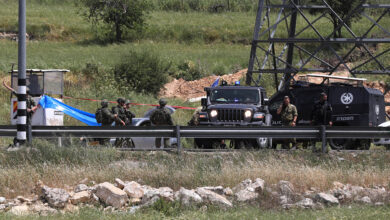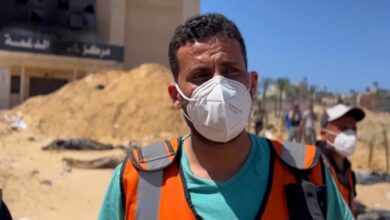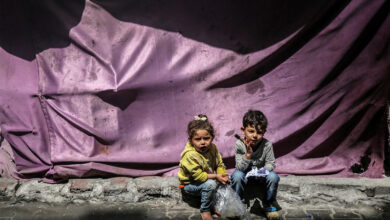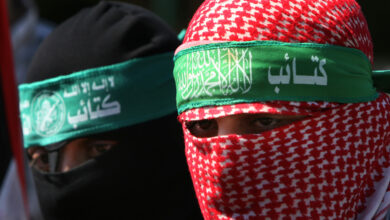Al-Masry Al-Youm remembers Hanzala, the figure who still keeps his eyes on Palestine and his back to the world. Even 23 years after creator Naji al-Ali's assassination, Hanzala remains a vital symbol of resistance and al-Ali the most famous cartoonist in the Arab world.
Born in Galilee in 1937, al-Ali was, like most Palestinians, forced out of Palestine in 1948. He settled with his family in Ain al-Halwa refugee camp in Lebanon at the age of 11. His drawing talent was often displayed on prison walls in Lebanon where he was detained in the 1960s for political activism in Palestinian camps. It was first discovered by journalist Ghassan Kanafani, who published them in Al-Huria magazine.
Soon al-Ali left Lebanon for Kuwait, where he worked at Al-Taliah magazine. In the early 1970s he settled once again in Beirut where he became a member of the editorial board of prominent Lebanese newspaper Al-Safir. This would be al-Ali's most productive period.
"Working for Al-Safir newspaper in Beirut in 1971 was the best part of my life, and the most productive. There, surrounded by the violence of many armies, and finally by the Israeli invasion, I stood facing it all with my pen every day. I never felt fear, failure or despair, and I didn't surrender. I faced armies with cartoons and drawings of flowers, hope and bullets. Yes, hope is essential, always. My work in Beirut made me once again closer to the refugees in the camps, the poor, and the harassed," reads the quote from al-Ali's official website.
But in 1982 things got ugly, and al-Ali became a witness to the brutal massacre in Palestinian refugee camps Sabra and Shatila by the Israelis. He moved to Kuwait where he worked for Al-Qabas and Al-Khalij newspapers. The stay ended abruptly in 1985 due to al-Ali's political connections, which led him to live in London, where he continued to work for Al-Qabas newspaper until his assassination in 1987 outside the newspaper offices.
His brilliance lies in breaking away from dogmas, in his utter freedom to criticize oppression, terrorism, and lack of democracy. He was never affiliated with any political party. His cartoons were inspiring in their simplicity and depth, and held a universal human appeal.
His characters were numerous, but the most outstanding is Hanzala (derived from the Arabic hanzal, a bitter plant) which was first printed in the late 1960s.
Hanzala is an angry 10-year-old, always portrayed from the back with his hands clasped, a sign of opposition to the Arab regimes. He is keeping his eyes on the Palestinian cause. Al-Ali explained that Hanzala will not grow old until he returns to his homeland, Palestine.
"This child, as you can see is neither beautiful, spoiled, nor even well-fed. He is barefoot like many children in refugee camps. He is actually ugly and no woman would wish to have a child like him. However, those who came to know Hanzala, as I discovered, later adopted him because he is affectionate, honest, outspoken, and a bum. He is an icon that stands to watch me from slipping. And his hands behind his back are a symbol of rejection of all the present negative tides in our region," reads another quote from al-Ali's official website.
Al-Ali's work spread to publications in Cairo, Beirut, Kuwait, Tunisia, London, and many other countries. He was widely believed to be the timeless conscience of Palestine, as well as an honest reflection of the people, rather than the regimes, of the Arab world.
"As soon as I was aware of what was going on, all the havoc in our region, I felt I had to do something, to contribute somehow. First I tried politics, to join a party. I marched in demonstrations, but that was not really me. The sharp cries I felt within me needed a different medium to express what I was going through. It was some time in the 1950s that I started drawing on the walls of our camp. During that period, the refugees had begun to develop some political awareness as a reaction to what had been taking place in the region: a revolution in Egypt, a war of independence in Algeria, things were brewing all around the Arab world. My job, I felt, was to speak up for those people, my people who are in the camps, in Egypt, in Algeria, the simple Arabs all over the region who have very few outlets to express their points of view. I felt my job was to incite them. The function of a political cartoonist, as I see it, is to provide a new vision.”
Al-Ali's "new vision" agitated a lot of people, leading him to be detained by police and often censored. His cartoons are powerful and true messages that call for justice in a truly unjust world. Unfortunately, his life was the price. On 22 July 1987, al-Ali was shot in the head while heading to work at the Al-Qabas offices in London. A few weeks later, he died. He was posthumously awarded the annual Golden Pen Award from the International Federation of Newspaper Publishers in 1988.




